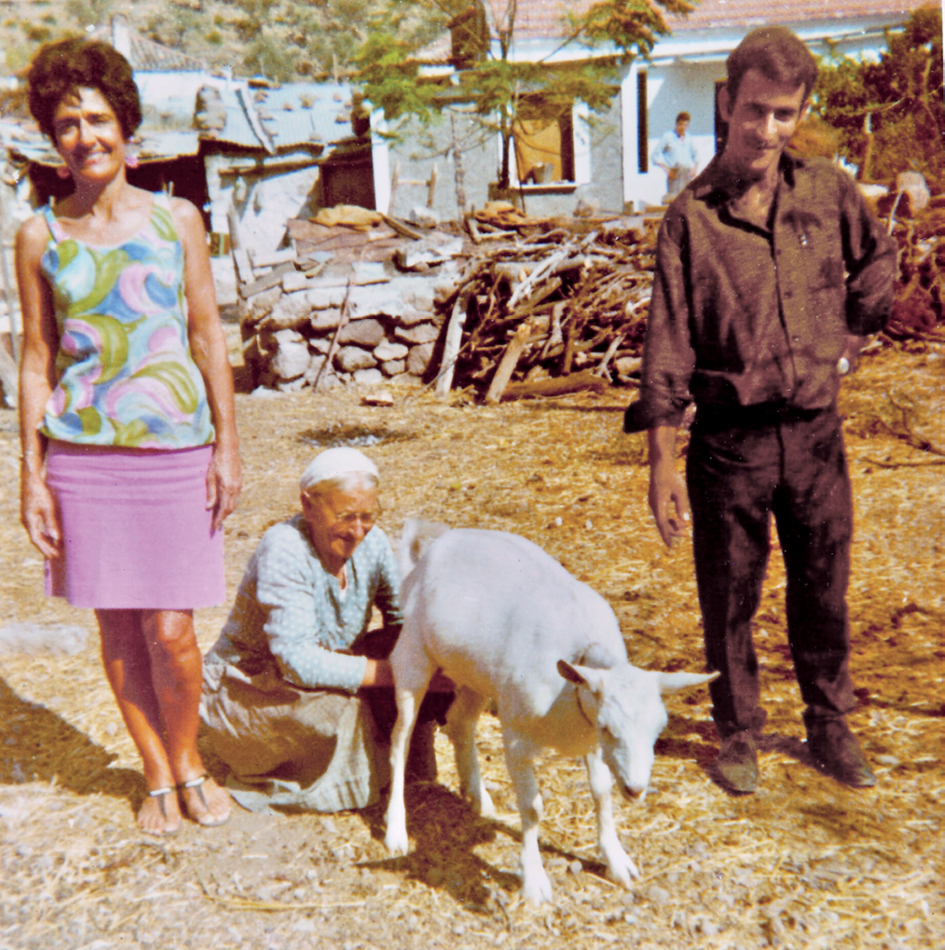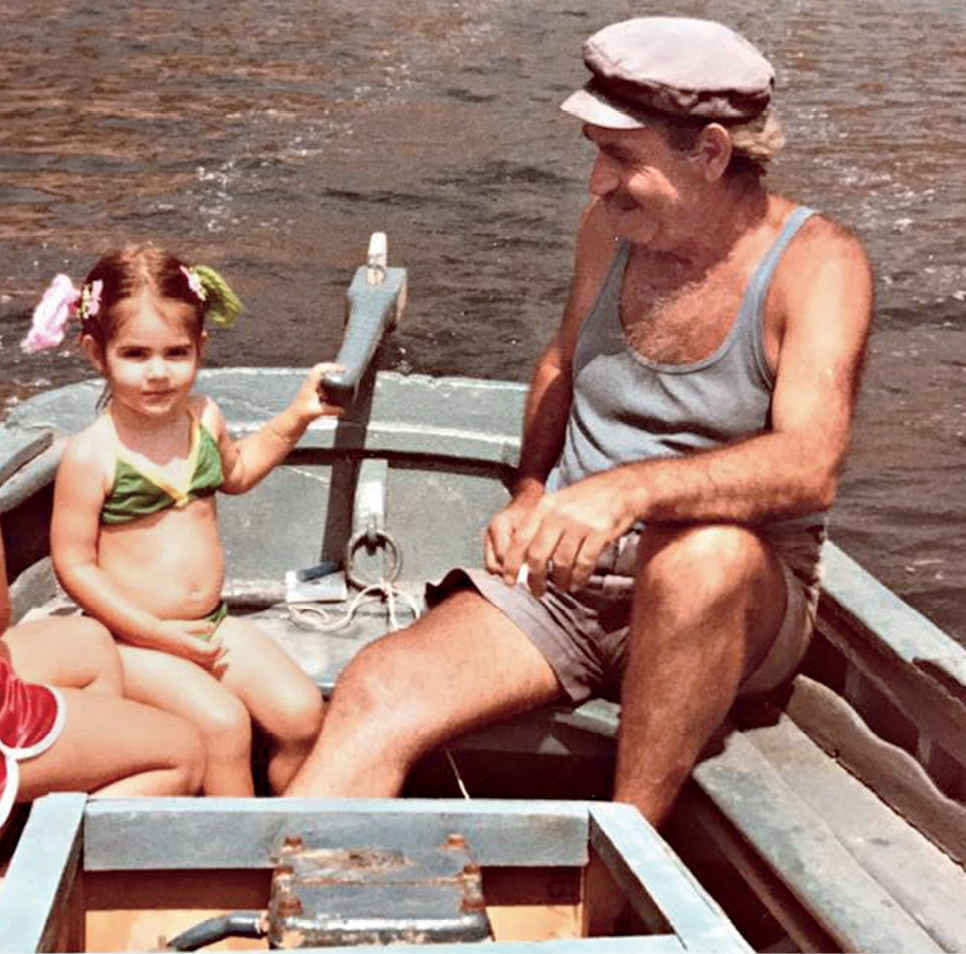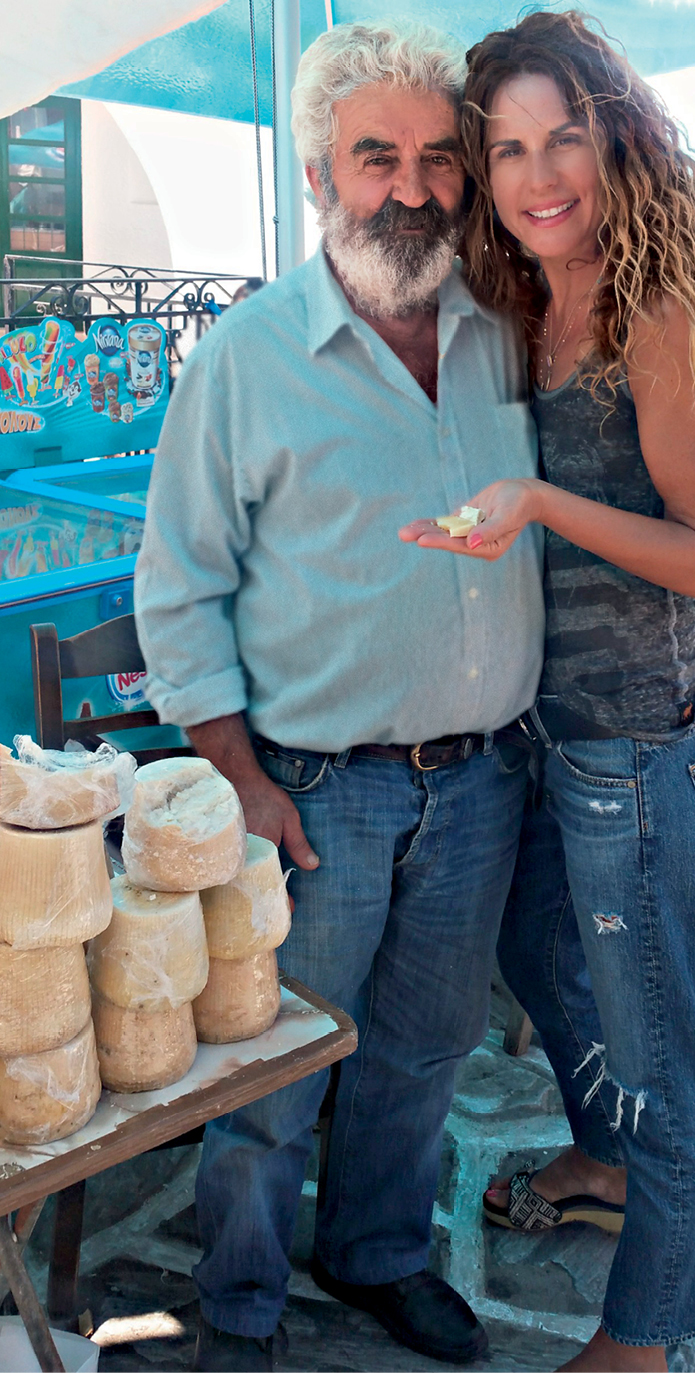PREFACE
WILD TIMES
I grew up wild.
When I was just three years old, my beloved grandfather, Constantine, decided it was time for me to learn how to fish. My family and I were visiting my paternal grandparents at their cottage in the ancient village of Methana, on the southern Peloponnese Greek peninsula made up of steep, rocky slopes. He whisked me off in his kaiki, one of the brightly colored traditional fishing boats found in the Mediterranean waters surrounding the Greek Islands. We finally stopped at one of his lucky fishing spots, where he showed me his favorite maneuvers, using just a simple pole. I was so thrilled when the first little fish landed on my line. My grandfather helped me pull the flipping, shiny guy into the boat.
Back at my grandparents’ house, my grandfather introduced me to the sometimes messy reality of wild food. Looking rather pleased with myself, I held the gutted, raw fish as he snapped a photo. It was a proud moment for him, too. He was teaching me how to harvest and prepare food that came directly from the sea surrounding us, the same way he’d been taught by his mother and father, and they had been by theirs. I’d solidified my bond with nature, and I embraced a pastime that had been practiced in this part of the world for centuries. Somehow I think I sensed the importance of this event—that I’d completed one of the critical first rites of growing up the “Wild Mediterranean” way, or a way of living that’s rooted deeply in age-old tradition, our natural surroundings, and the close-knit bond of a community.
Looking back, it occurs to me that many of my early memories involve food in some way. In my grandparents’ sun-bathed hamlet, the villagers threw huge parties known as panagiria in the center of their small towns each spring and summer—open-air events filled with great food, local wine, and music to entice people of every age to take part in the customary Greek dances. The men would roast lambs and chickens on huge fire spits, and the women would make their specialty dishes from the bountiful produce of the season, such as spinach and feta pies, yemista (stuffed vegetables), and horiatiki (village salad) served with psomi (stone-baked bread). I recall tables laden with desserts, from honey-laced baklava to custard-filled galaktoboureko to mounds of curiously fluffy-yet-crunchy koulourakia, Greek Easter cookies.
Beyond the food, there was real connection among the people. These villagers shared everything from the joy of birth to the grief of death. They delighted in the wildness of the landscape that surrounded them and spent time walking and hiking the volcanic hills, fishing and swimming in the blue waters. Nearly everyone kept a garden and tended olive and citrus trees, pressing their own oil and juices. These happy pursuits never stopped, even in old age.
My parents carried this way of life with them when they settled in southern California. As a result, I was always a little different from other kids. If you’ve seen the film My Big Fat Greek Wedding, then you’ve got some idea. Few California girls were named Stella—at least not in the mid-1990s—and my parents had strong ideas of how a young woman should be raised: knee-length (or longer) dresses and no makeup (although my mom did slip me some lip gloss behind my father’s back). My brother and I were not allowed to stay indoors and watch TV when it was sunny outside, which in southern California was pretty much all the time. Invariably, our parents shooed us outside to play, and encouraged us to run, swim, climb trees, and explore on our own. After all, that’s how they were raised.
They carried on other traditions in California, too. When my father’s friends and family moved from Athens to the US, he emulated the big village parties by inviting everyone to our house for huge feasts. These boisterous affairs often went on late into the night as dozens of cousins, aunts, uncles, friends, and neighbors would descend with Mediterranean specialties. Only the music changed. In addition to Greek standards, my parents played everything from Michael Jackson to classic rock ’n roll. The rest of the revelry remained the same: They would drink wine, sing loudly, dance with abandon, and talk for hours. But above all, they would eat—lamb roasted with oregano and potatoes, a medley of bright peppers sprinkled with feta, stuffed grape leaves. One of my favorite dishes was briam, perfectly ripe seasonal vegetables baked in olive oil. It’s a simple-sounding dish, but it takes skill to get just right.
Our everyday cooking also illustrated my family’s Mediterranean ways. My mother balked at packaged fare, and fast food was out of the question. We ate dishes such as braised pastured meats slowly cooked in earthenware, beans baked with tomatoes and herbs, and stews made according to season. She packed moussaka for school lunch. Longing for a taste of home, my mother continued to make some of the hearty specialty dishes for my father, even if it required ingenuity on her part to find the right ingredients. Let’s just say my parents were among the few people in southern California who knew how to source a whole lamb when needed!

My grandmother, Evangeline, left, with her aunt and cousin in our village, Methana, Greece.
As kids, we returned to Greece each summer. Even though my brother and I often were groggy following the international flight, we could barely contain ourselves during the two-hour ride from Athens to the familiar sights and sounds of Methana. Within moments, he and I stepped back into a slower rhythm of life. We chatted easily with the villagers we’d known all our lives. After breakfast each morning, my grandmother would give us a bit of money and we’d head out on our bikes, picking up a few snacks and little games at the small store near my grandparents’ house. In California, we still ate pretty “wild” in comparison to other families, but we would still get the occasional processed treat. In my grandparents’ village, good luck if you want a candy bar! Well into the 1990s, there was just one brand of chips and two options for ice cream. The only classic Western staple was Coca-Cola.
When we brought these “delicacies” home, our relatives would moan, clutch their hearts, and complain with such vigor that you’d think the world was ending. Once, my aunt dramatically shook her hands to the heavens as she wailed, tears in her eyes, “Why, Stella! Why do you buy these fake things? Why, when we have fresh peaches from your uncle’s tree or Maria’s koulourakia? Why?!”
Aside from the occasional store-bought treat, though, we were raised eating the way the people in my parents’ village have for centuries, and that—along with fortunate genetics—ensured that we grew up strong, tall, and lean. By age ten, I was already five feet five inches tall, with a long torso and long legs. I had shiny hair past my shoulders and clear skin. I slept well and felt great. I couldn’t have been any healthier.
When I was ten years old and swimming at a public pool near our home in Orange County, California, a coach asked my mother if I’d considered swimming competitively.

Fishing with my grandfather Constantine in Greece.
“She’s a natural,” he told my mom.
As it turned out, he was right. Within months, I was one of the youngest swimmers in advanced leagues. By age eleven—just one year after starting my training—I was competing in the Junior Olympics on the USA Swimming circuit.
I awoke before dawn to swim and then returned to the pool for hours of after-school training. I spent a good chunk of my life looking down at the blurry blue bottom of a pool. Like thousands of kids across the country, I trained to compete at the highest levels. For a while Olympic medalist Janet Evans trained in her own lane at the end of the same pool as I did, and I would sometimes catch a glimpse of her. I believed that if I worked hard, maybe someday I’d stand on a podium with three gold medals, just as Janet had. I’m thankful for the stringent work ethic competitive swimming imparted to me. It shaped the way I approach life, even now.
But the training took its toll, and not in a way that you’d expect.
My mother followed the coach’s instruction and shifted what I ate to a hyper-low-fat/high-carbohydrate diet, the recommended regimen for young athletes at that time and still followed by many to this day. The reasoning: Fats are bad, carbs provide fuel. For some people, this diet might not have been much of a change. For me, though, it was a radical departure from the olive-oiled, meat-and-fish-filled, vegetable-packed world of Mediterranean fare that I’d thrived on growing up. I went from regular meals of lean proteins, seasonal vegetables, and occasional grilled lamb to heaping plates of pasta, protein bars, and coach-approved sugar-laden sports drinks. Olive oil—an evil fat—was a no-no.
Something changed in me. My hair started falling out. At first, we blamed the chlorine, but then I started succumbing to colds and flus regularly, although I had rarely been sick as a child. My olive complexion turned pale. I had no energy. I was constantly fatigued, listless, and bloated. I looked nothing like the sun-kissed Mediterranean girl I’d been just a couple of years earlier. But in competitive training, you don’t take days off. Part of the program is learning to push through obstacles, whether they’re mental or physical.
So I pushed and pushed until one day, I just snapped and decided to quit.
Abandoning a routine that involved hard physical exercise several hours a day added a layer of depression to my overall lethargy. I later read that Olympic swimmer Michael Phelps also felt depressed when he gave up his intensive training routine, but at the time I didn’t know what was happening to me. I just felt terrible.
My mother took me to doctors, who couldn’t figure out what was wrong. One diagnosed me with severe anemia, although he couldn’t explain why an active teenager with no discernible health issues would develop such a serious condition.
By the time I headed off for my freshman year of college I was back to eating better but continued on a steady diet of protein bars and sugar-laden granola, and my health complaints continued unabated. Determined to understand why my life had changed so drastically, I considered two possible majors at school: sports medicine or nutrition sciences. When a counselor explained that majoring in nutrition involved a deep knowledge of food and how it interacts with the body, I was sold.
Fascinated by the subject, I lived and breathed nutrition. For years, I relied on the conventional wisdom I was taught in school: Weight loss was simply a matter of calories in, calories out. I even became a vegan, rigorously, and often joylessly, trying to choke down all the prescribed macro- and micronutrients each day. Yet I still didn’t feel completely healed.
After graduation, I started a nutrition consulting business in Southern California, meeting day after day with clients whose complaints and conditions were eerily similar to the ones I’d experienced when I was younger. Although many of them wanted to lose weight, they also reported other issues such as lack of energy, bloating, depression, and cloudy thinking. I could certainly empathize. Even as I treated my clients, I was dragging myself through the day. I wasn’t as depleted as I had been when I was an anemic teenager and training six hours a day in a swimming pool, but I wasn’t exactly pulsing with energy, either. I needed a jolt of caffeine to kick myself into gear each morning, I fell into a slump most afternoons, and I had a tough time getting to sleep and staying asleep. I also found it difficult to deal with the common day-to-day stressors and often felt blue or anxious. My elimination was irregular, and, like many of us, I was also struggling to be consistent with workouts and maintain a lean frame. Plus, I had headaches and cravings, especially for oily pizza around the time of my period. I was still grappling with a slight case of anemia. Still, because the symptoms weren’t dramatic, I accepted the low hum of my life, as most of us do.
One particularly challenging day, I thought about the photo of me with my gutted fish. It occurred to me that the people I know who lived in Greece never had such symptoms. I know this because village life encourages sharing just about everything, including health issues—right down to one’s bowel movements (!) and the smallest aches and pains. Understanding and discussing the natural functions of our bodies is part of how that community shares. So it gnawed at me that the Mediterranean villagers remained robust and healthy well into old age while relatively young people came into my office with such a wide variety of complaints.
It took me years to discover the connection between health, longevity, and the food we eat—specifically, how that food affects the landscape of the digestive system, from which so much of our vigor, immunity, and wellness emanates—but when I did, it challenged everything that I had been taught, by both my teachers and other experts in the nutrition field. I realized that I needed to go back to the beginning, back to where my own health and vibrancy came from. I needed to rediscover the lessons that my mother and father and their families and generations of families before them had taught me. I needed to reconnect with the whole, wild Mediterranean foods that nourished my body and the community spirit that fed my soul. I had to, in every sense of the world, find my “wild” again.

If you’re reading this book, then I’m willing to guess that somewhere along the way you too lost your native self. Maybe you don’t have as much energy as you think you should, you can’t maintain a healthy weight, or you’re battling chronic illness. Maybe it just feels like your “light” isn’t shining so brightly. Whatever your concerns might be, you’ll be relieved to know that most if not all of these maladies stem from a single source: a digestive system that’s sorely in need of repair and rejuvenation. It’s very likely that your gut—the hub of digestive health—isn’t getting the “wild” or whole-food–based, living nutrition it needs to thrive, and in turn, keep all of your body’s systems working optimally. With this book, I’m going to help you connect with your own wild roots in the spirit of healing and staying healthy. I’ll share the traditional wisdom—from eating habits to daily rituals—that is the key to living a long, satisfying, well life. (Not to mention the science that completely supports it!) So please join me on this journey back to where I come from, where my people come from, and where, ultimately, better lives are made. Welcome to the Wild Mediterranean.